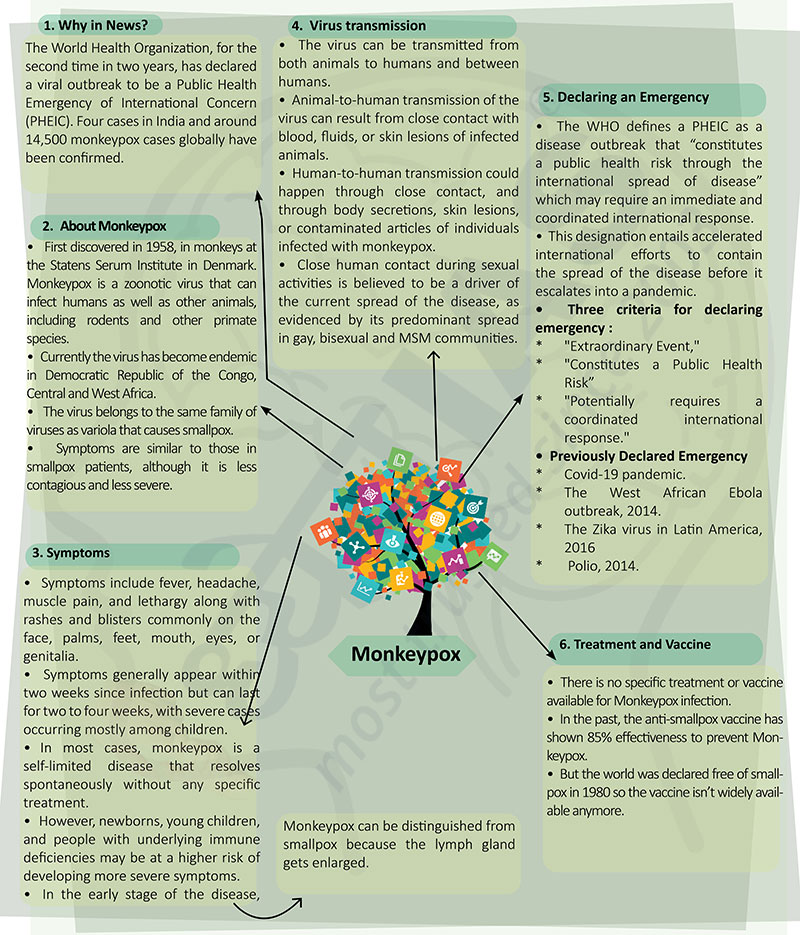Brain-booster
/
18 Aug 2022
Brain Booster for UPSC & State PCS Examination (Topic: Monkeypox)

Why in News?
- The World Health Organization, for the second time in two years, has
declared a viral outbreak to be a Public Health Emergency of International
Concern (PHEIC). Four cases in India and around 14,500 monkeypox cases
globally have been confirmed.
About Monkeypox
- First discovered in 1958, in monkeys at the Statens Serum Institute in
Denmark. Monkeypox is a zoonotic virus that can infect humans as well as
other animals, including rodents and other primate species.
- Currently the virus has become endemic in Democratic Republic of the
Congo, Central and West Africa.
- The virus belongs to the same family of viruses as variola that causes
smallpox.
- Symptoms are similar to those in smallpox patients, although it is less
contagious and less severe.
Symptoms
- Symptoms include fever, headache, muscle pain, and lethargy along with
rashes and blisters commonly on the face, palms, feet, mouth, eyes, or
genitalia.
- Symptoms generally appear within two weeks since infection but can last
for two to four weeks, with severe cases occurring mostly among children.
- In most cases, monkeypox is a self-limited disease that resolves
spontaneously without any specific treatment.
- However, newborns, young children, and people with underlying immune
deficiencies may be at a higher risk of developing more severe symptoms.
- In the early stage of the disease,• Symptoms include fever, headache,
muscle pain, and lethargy along with rashes and blisters commonly on the
face, palms, feet, mouth, eyes, or genitalia.
- Symptoms generally appear within two weeks since infection but can last
for two to four weeks, with severe cases occurring mostly among children.
- In most cases, monkeypox is a self-limited disease that resolves
spontaneously without any specific treatment.
- However, newborns, young children, and people with underlying immune
deficiencies may be at a higher risk of developing more severe symptoms.
- In the early stage of the disease, Monkeypox can be distinguished from
smallpox because the lymph gland gets enlarged.
Virus transmission
- The virus can be transmitted from both animals to humans and between
humans.
- Animal-to-human transmission of the virus can result from close contact
with blood, fluids, or skin lesions of infected animals.
- Human-to-human transmission could happen through close contact, and
through body secretions, skin lesions, or contaminated articles of
individuals infected with monkeypox.
- Close human contact during sexual activities is believed to be a driver
of the current spread of the disease, as evidenced by its predominant spread
in gay, bisexual and MSM communities.
Declaring an Emergency
- The WHO defines a PHEIC as a disease outbreak that “constitutes a public
health risk through the international spread of disease” which may require
an immediate and coordinated international response.
- This designation entails accelerated international efforts to contain
the spread of the disease before it escalates into a pandemic.
- Three criteria for declaring emergency :
- "Extraordinary Event,"
- "Constitutes a Public Health Risk”
- "Potentially requires a coordinated international response."
- Previously Declared Emergency
- Covid-19 pandemic.
- The West African Ebola outbreak, 2014.
- The Zika virus in Latin America, 2016
- Polio, 2014.
Treatment and Vaccine
- There is no specific treatment or vaccine available for Monkeypox
infection.
- In the past, the anti-smallpox vaccine has shown 85% effectiveness to
prevent Monkeypox.
- But the world was declared free of smallpox in 1980 so the vaccine isn’t
widely available anymore.







